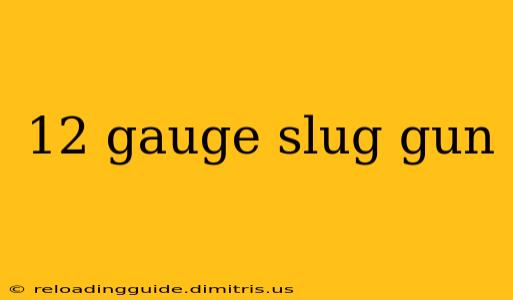The 12 gauge slug gun holds a unique position in the world of firearms. Powerful, versatile, and reliable, it's a favorite among hunters pursuing large game and homeowners seeking a serious home defense option. This guide dives deep into the world of 12 gauge slug guns, covering everything from choosing the right shotgun to understanding ammunition options and responsible gun ownership.
Understanding the Power of the 12 Gauge Slug
The 12 gauge shotgun's power stems from its large bore diameter, allowing for the expulsion of substantial projectiles. Slugs, unlike birdshot or buckshot, are single projectiles designed for accuracy at longer ranges. This makes them ideal for hunting deer, bear, and other large game animals, where a precise shot is crucial for a clean kill and ethical hunting practices.
Types of 12 Gauge Slugs:
Several types of slugs exist, each offering different characteristics:
-
Rifled Slugs: These slugs have grooves machined into them, imparting spin for improved accuracy and longer range. They are generally preferred for hunting applications.
-
Foster Slugs: These are simpler, less expensive slugs with a round nose. Their accuracy is typically less than rifled slugs, particularly at longer distances.
-
Sabot Slugs: These slugs are designed to fit within a plastic sabot that helps them engage the rifling of a smoothbore barrel, improving accuracy.
-
Brenneke Slugs: Known for their deep penetration and substantial stopping power, these slugs are popular choices for both hunting and home defense.
Choosing the Right 12 Gauge Slug Gun:
Selecting the appropriate 12 gauge slug gun depends heavily on your intended use. Consider the following factors:
Barrel Length:
-
Shorter barrels (18-20 inches): Offer maneuverability, making them suitable for home defense. However, they typically sacrifice some accuracy and range.
-
Longer barrels (24-28 inches): Provide improved accuracy and range, making them better suited for hunting.
Barrel Type:
-
Rifled barrels: Designed specifically for rifled slugs, these barrels offer the best accuracy.
-
Smoothbore barrels: While capable of firing slugs, accuracy is generally lower than with rifled barrels. They're often chosen for versatility, as they can also fire buckshot and birdshot.
Action Type:
-
Pump-action: Reliable, relatively inexpensive, and allows for quick follow-up shots.
-
Semi-automatic: Offers faster firing rates, but can be more expensive and requires more maintenance.
-
Break-action: Simple, reliable, and often favored for hunting due to their inherent safety.
Responsible Gun Ownership and Safety:
Owning a 12 gauge slug gun comes with significant responsibility. Safe handling and storage are paramount:
-
Always treat every firearm as if it were loaded.
-
Never point a firearm at anything you do not intend to shoot.
-
Keep your finger off the trigger until ready to fire.
-
Be sure of your target and what is beyond it.
-
Store firearms securely, unloaded and locked up, away from children and unauthorized individuals.
-
Regularly practice safe gun handling and marksmanship at a properly supervised shooting range.
Beyond the Basics: Accessories and Maintenance
To enhance your 12 gauge slug gun experience, consider accessories like:
-
Scopes or sights: For improved accuracy at longer ranges.
-
Sling: For comfortable carrying during hunting.
-
Chokes (for smoothbore barrels): Can slightly improve patterning, but aren't as critical with slugs as they are with shot.
Regular cleaning and maintenance are crucial for ensuring the reliability and longevity of your firearm. Consult your firearm's manual for specific cleaning instructions.
Conclusion: The Versatile 12 Gauge Slug Gun
The 12 gauge slug gun stands as a potent and versatile firearm. By carefully considering your needs and understanding the key factors discussed above, you can choose a shotgun that meets your specific requirements. Remember, responsible gun ownership is not just a legal obligation but a moral imperative. Always prioritize safety, and enjoy the capabilities of this powerful tool responsibly.

